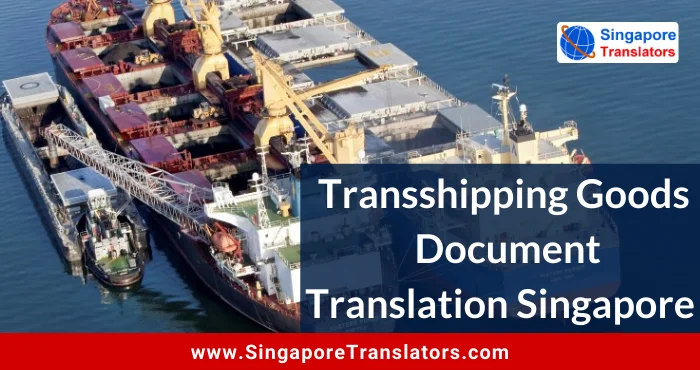Several traders and businesses are intending to transship goods from Singapore to any other country. In short, transshipment means the transport of goods or items to any particular destination. There are several licenses and permits that every trader and business needs to keep in mind while transshipping goods through Singapore. Also, there are few exemptions of the license for free trade zone. Still, many traders are not familiar with the essential things related to the transshipment of goods through Singapore. Keep on reading the article to know complete details about transshipment of goods and a few of its license and permits followed by the dutiable goods associated with transshipment.

Table of Contents
hide
What is the need for translation while transshipping goods through Singapore?
Documents from different countries usually need to be translated into the host country’s language in order for the recipient to grasp what it is. Transshipping of goods through Singapore will require you to have documents type-written in English, Malay, and Tamil. These documents may include Invoices, Delivery Orders, Customs Documentation, etc. For small shipments, these can be handwritten but for bulk shipments, it would not be feasible – hence a document translation service is necessary before they are handed over to any authorities.
What is the transshipment of goods?
Transshipment of goods is the transport of goods or containers to any specific destination and then again the shipment of the same good or container to another destination.
The transshipment of goods or items usually occurs in major transportation hubs. Most foreign transshipment also occurs mainly in the designated custom areas to prevent the custom checks or duties or to avoid major barriers that arise during the efficient transport of:
In order to avoid the barriers of efficient transport of goods that are transported from one country to another country without even first getting imported to the country.
Those goods that are being transshipped through Singapore are not deemed for any duties or taxes usually charged on the imports.
Get Fast & Accurate official notarization for ICA, MOM, MFA.
Reasons for transshipments
Generally, there are three major reasons for which transshipment is required:
- When you do not have (or only have expensive means of transport) direct air, land, or sea interconnection among the importer and exporter of the goods, the requirement of transshipment arises. However, consolidation means that when small goods or items are integrated with the large shipments. In comparison, the division of shipment at the destination port is known as deconsolidation.
- Another reason when going transshipment makes sense is when the destination’s designated port is unavailable due to the low tide or if the port cannot transport big vessels.
- If you are willing to ship cargo or containers from one country to another through transshipment, to avoid trade restrictions.
Requirements
The major requirements for the transshipment are specifically for the controlled goods; upon transshipment of controlled goods, a license or other types of approval needs to be acquired from the concerned Competent Authorities (CAs) before transshipment takes place through Singapore.
The transshipment of several goods through Singapore from or to countries licensed by the United Nations Security Council (UNSC) is not allowed. Therefore, to check if transshipment of goods regulation through Singapore is addressed to trade restrictions, you will require to refer to the relevant United nation Security Council regulations.
Procedures
For the shipment of the controlled goods within the areas of free trade zone, both traders and businesses are required to acquire the transshipment permit via Trident, mainly for transshipment goods that were earlier transshipped into the Free trade zone from the abroad for a temporary storage facility within the Free Trade Zone, awaiting transshipment through the same FTZ.
However, for the transshipment of goods via one free trade zone to another free trade zone, both traders and businesses need to acquire the transshipment permit digitally via Trident only if the transshipment of the goods were previously performed and brought into the free trade zone from abroad country and consecutively transshipped through the other free trade zone.
Only licensed shipping agents, freight forwarders/cargo agents, and airline agents can submit the Transshipment Permit Applications only if the shipment process is concealed Through Bills of Lading or Through Air Way Bills. Once the transshipment of permit application gets approved by the concerned authority, you need to present the photocopy of the transshipment permit, which you need to send to the Permits Compliance Branch along with the Through Ocean BL or Master Air Waybills or House BL or House Air Waybills for further verification.
Errors and Offences
The traders and businesses will get penalized if they do not meet the specified customs requirements declared by the Singapore customs act, the strategic goods act, regulations of the import and export activities, and their related legislation.
Examples of common offences
Some of the possible examples of common publishable offences are as follows:
Violation of permit conditions
- The trader will be penalized if they cannot present the permit for the Customs clearance at the free trade zone and the second checkpoint for inter-gateway movement.
- When the trader is making a fake declaration
- When the traders wrongly claim controlled goods as ship spares, the controlled goods need advance approval from the concerned authorities.
- When the goods are transshipped without any valid permit.
- Unable to acquire the Transshipment permit with message form “Out (with or without CO)” and Declaration Type “Direct (including storage in FTZ) (DRT)” during the inter-gateway movement among to FTZs.
Transfer of strategic goods without the correct permits
- Transshipping information security equipment, which is controlled under the SGCA, with an Outward Transshipment (“OT”) permit instead of the Strategic Goods Transshipment (“XP”) permit.
- The traders might be penalized if they are transshipping the information security tools that are covered under SGCA with an outward transshipment permit rather than Strategic Goods Transshipment (“XP”) permit.
You will have to keep few things in mind prior to transshipping goods through Singapore:
- Ensure that the goods that you intend to ship are controlled goods, prohibited goods, or strategic goods for transshipment.
- The United Nations Security Council has recently imposed a license that restricts the import, export, transit, and transshipment of several goods via Singapore to few abroad countries.
What are the Goods that can be transshipped?
- Non-controlled goods or items can be easily transshipped from Singapore without the requirement of any valid license or permits.
- The transshipment of several goods is under control by the concerned competent authority (controlled goods).
- The traders who basically deal in the transshipment of controlled goods need to have the required license or permits prior to proceeding with the transshipment of goods through Singapore.
- Many traders need to apply for special permits for re-exporting, transshipping, exporting, and transporting strategic goods, including munitions or bio-chemicals.
- The regulations of the Strategic goods rest in the hands of the Strategic Goods (Control) Act. However, It includes all the goods and technology which might be used for weapons of mass destruction.
What Happens When the Goods Arrive?
- Transhipment of goods that arrives through air or sea gets stored at the free trade zone storage facility before loading to any other vessels or aircraft.
- The free trade zones are one of those designated areas in seaports and air where duties and further goods-related tax like Goods and Service Tax(GST) are temporarily eliminated.
All the dutiable goods are allowed to be stored at the storage facilities of the free trade zone, excluding liquors and cigarettes.
Free Trade Zones (FTZs)
The free trade zone is one of the most important designated areas where the usual trade barriers, including tariffs and quotas, are suspended. On the other hand, a few bureaucratic are also fewer in terms of welcoming several businesses and foreign investment. Therefore, you do not require paying any duty or goods-related taxes for those goods stored in the free trade zone storage facilities. However, you only need to pay the taxes on duty when the goods are ready to leave the free trade zone and intend to enter the customs territory for local consumption.
Hire a Language translator for converting your legal & Other Documents.
What Permits are needed?
The traders can apply for the transhipment permit either through the trade net, cargo agent, or freight forwarder only under the following circumstances:
- When the traders intend to ship goods from one free trade zone to another free trade zone.
- When the traders perform transhipment of the controlled goods within the free trade zone, suppose when goods are transported from the ship in the free trade zone to the designated storage facility within FTZ.
- When transshipping strategic goods the requirement of transhipment arises.
Controlled Goods
If one trader is transshipping controlled goods within the free trade zone, then the transhipment permit needs approval from the competent authorities. The competent authorities are basically the government agency handling the operation of all the controlled goods.
Strategic Goods
If you are transshipping the strategic goods, in such a case you need to acquire the Strategic Goods Control (SGC) Trade Net Permit prior to the goods or container leaves Singapore.
If they are also controlled goods, the application would be sent to the CAs for approval before going to Singapore Customs for final approval.
Who Can Transship Goods through Singapore?
- Both foreign and local traders are granted to transship goods through Singapore. For example, a) A local traders willing to export toys from Vietnam to Europe, then they might use the Singapore transhipment hub to transport the goods, b) whereas a foreign trader residing in Europe intending to import toys from Vietnam also have the choice to use Singapore as the transhipment hub.
- However, the various foreign traders might find it more beneficial to catch up with cargo agents or local freight forwarders for assistance in applying for the permits via Trade Net.
Why Use Singapore for Transshipping
Singapore is considered one of the largest transhipment across the globe. This allows the transhipment to be done in a cost-effective, fast, and efficient manner.
Sea Cargo
- PSA Singapore terminal offers the goods shippers an option of more than 200 shipping lines interconnected with 600 ports in more than 120 countries worldwide. However, the ships of Singapore sail daily to each extensive port of the world.
- The PSA regulates five container terminals in Singapore, i.e., Tanjong Pagar, Keppel, Brani, Pasir Panjang, and COSCO-PSA.
- Jurong Port is Singapore’s primary bulk and convectional cargo route, consisting of 23 berths delivering more than 7000 vessels each year.
- It is considered Singapore’s only dry bulk cargo handling port, which allows the shipper of the goods to transship their goods conveniently.
- Singapore has one of the largest common-user cement terminals across the globe, having a capacity of more than 4,000,000 tonnes a year.
- Besides this, it also consists of an extensive drive-up warehouse called Jurong Logistics Hub.
Air Cargo
- The Changi airport Centre provides a 24×7 one-stop service center for shippers, airlines, consignees, and cargo agents to transship the goods without any hassle.
- Another reason for choosing Singapore for the transhipment of goods is that the cargo terminal is a free trade zone making it convenient to transship the goods to another country. Transporting the cargo from one airline to another does not require leaving the terminal, however, either removing or reducing customs requirements.
- Another benefit of choosing Singapore air cargo for transhipment of goods is because of state of the art infrastructure such as automated stacker system and container and pallet uplifting transfer vehicles, which have interchanged the manual labour, thus allowing the cargo managing more effective and quick.
Choose our Translators for Rapid Translation Service
After reading the above article on transshipping goods through Singapore might have cleared all your doubts related to T. Above we have covered sufficient details to let you understand the process of transhipment and licensing required. So before proceeding with transhipment go through each thoroughly to avoid getting penalized.
Along with such, our team of highly certified translators at Singapore translators takes pride in delivering you legal translation service at a cost-effective price. The things that have kept us ahead of any other translation company in Singapore are our consistent Quality document translation. However, our translators also offer Immigration document translation for all the Singapore passes and permits.


